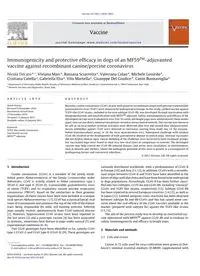
2011 Immunogenicity and protective efficacy in dogs of an MF59_-adjuvanted vaccine against recombinant canine_porcine co PDF
Preview 2011 Immunogenicity and protective efficacy in dogs of an MF59_-adjuvanted vaccine against recombinant canine_porcine co
Vaccine 29 (2011) 2018–2023 Contents lists available at ScienceDirect Vaccine journal homepage: www.elsevier.com/locate/vaccine Immunogenicity and protective efficacy in dogs of an MF59TM-adjuvanted vaccine against recombinant canine/porcine coronavirus Nicola Decaro a,∗, Viviana Mari a, Rossana Sciarretta a, Valeriana Colao a, Michele Losurdo a, Cristiana Catella a, Gabriella Elia a, Vito Martella a, Giuseppe Del Giudice b, Canio Buonavoglia a a Department of Veterinary Public Health, Faculty of Veterinary Medicine of Bari, Strada per Casamassima km 3, 70010 Valenzano, Bari, Italy b Novartis Vaccines and Diagnostics, Siena, Italy a r t i c l e i n f o Article history: Received 8 November 2010 Received in revised form 27 December 2010 Accepted 11 January 2011 Available online 25 January 2011 Keywords: TGEV-like canine coronavirus Inactivated vaccine MF59TM adjuvant a b s t r a c t Recently, canine coronavirus (CCoV) strains with putative recombinant origin with porcine transmissible gastroenteritis virus (TGEV) were shown to be widespread in Europe. In this study, a killed vaccine against TGEV-like CCoV strains, included in the new subtype CCoV-IIb, was developed through inactivation with betapropiolactone and emulsification with MF59TM adjuvant. Safety, immunogenicity and efficacy of the developed vaccine were evaluated in vivo. Five 10-week-old beagle pups were administered (three weeks apart) two vaccine doses, whereas two animals served as unvaccinated controls. The vaccine was shown to be safe as no local neither systemic reactions were observed after first and second dose administration. Serum antibodies against CCoV were detected in vaccinates starting from study day 14 (by enzyme- linked immunosorbent assay) or 28 (by virus neutralisation test). Subsequent challenge with virulent CCoV-IIb resulted in the development of mild gastroenteric disease in control pups, whereas vaccinates did not display clinical signs. Faecal shedding of the challenge virus occurred in both treatment groups, but vaccinated dogs were found to shed very low viral titres in comparison to controls. The developed vaccine may help control the CCoV-IIb-induced disease (and active virus circulation) in environments, such as kennels and shelters, where the pathogenic potential of this virus is greater as a consequence of predisposing factors and concurrent infections. © 2011 Elsevier Ltd. All rights reserved. 1. Introduction Canine coronavirus (CCoV) is a member of the newly estab- lished genus Alphacoronavirus of the family Coronaviridae, order Nidovirales. CCoV is strictly related to feline coronavirus type I (FCoV-I) and type II (FCoV-II), transmissible gastroenteritis virus of swine (TGEV) and its respiratory variant porcine respiratory coronavirus (PRCoV). Based on the similarities in their genomic organisation, all these viruses have been now included in a unique viral species Alphacoronavirus-1 [1]. CCoV has a classical faecal–oral route of transmission and colonises the top of the villi of the enteric tract, being responsible for mild, self-limiting enteritis. Infected pups usually recover spontaneously from CCoV-induced disease [2]. However, hypervirulent CCoV strains have been reported in the last years [3] and a pantropic variant [4] has been associated to systemic, sometimes fatal disease in pups under natural [5] and experimental conditions [6–8]. Two CCoV genotypes have been identified so far, namely CCoV type I (CCoV-I) and CCoV type II (CCoV-II) [9]. These genotypes are ∗ Corresponding author. Tel.: +39 0804679832; fax: +39 0804679843. E-mail address:
